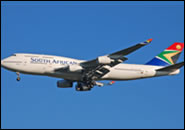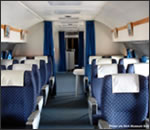South Africa Airways: The Case of Subsidizing Inefficiency?
 |
| South African Airways |
SAA has already been found guilty of abusing its dominant position. In July 2005, it was ordered to pay a fine of R45 million for the practice of paying incentives to travel agents to book flights on SAA at the expense of private carriers over a protracted period of several years. Midway through the 2007/08 financial year, the South African Treasury transferred over R744 million to the Department of Public Enterprises (DPE) to assist in the restructuring of South African Airways (SAA) claiming that it was an "unforeseen and unavoidable" cost. But the use of the words "unforeseen" and "unavoidable" are grossly misleading because government is acutely aware of SAA's track record and the implications of continuing to hold onto this loss making enterprise.
The mind boggles at the suggestion that this could have come as a surprise. The DPE has stated repeatedly that its immediate priority is to restructure SAA into a profitable airline that can operate in a commercially sustainable way. But instead, SAA has demonstrated that it is unlikely to become profitable any time soon. Why doesn't government leave the business of business to business and get on with addressing other pressing issues – such as creating an enabling environment in which real businesses can function profitably and competitively?
Instead of reducing the burden on taxpayers by curtailing operations, SAA expanded its operations through the introduction of the subsidiary low cost carrier Mango. On top of this, it intends to provide additional services into the rest of Africa. With Mango planning to introduce some form of business class product and SAA trying to attract more low fare passengers, the two entities are competing against one another.
 |
| Inside SAA |
In June 2006, SAA was transferred from Transnet to the DPE because Transnet did not consider the airline to be a core operation. It was at this point that the government should have cut its losses. However, the opportunity to genuinely turn around SAA still exists. SAA, its subsidiaries, and sister outfit South African Express Airways (SAX), should be auctioned off. The government will receive funds from the sale and a new source of tax revenue will be created. Alternatively, some form of voucher privatisation could be employed to transfer the assets into the hands of the general population.
Through the decades, successful privatisation has shown that private sector managers who are free to innovate and use their initiative, manage businesses more effectively than public sector officials. A system where individuals and private enterprises have the freedom to make decisions produces more efficient results than one in which government constantly interferes. This is not because people are always rational and seldom make mistakes, but rather that most people are more rational and make fewer mistakes when promoting their own interests than well-intentioned government officials.
Private companies, no matter their size, are subjected to the ruthless discipline of insolvency or to being taken over by more efficient competitors. As long as firms are not protected by government-granted monopolies or taxpayer-guaranteed finance, in order to survive, they are compelled to profitably provide an efficient service to customers when in competition with all other existing and potential suppliers. If governments protect public enterprises by keeping out potential competitors or making taxpayers pay for their mistakes, that discipline is removed and the result is poor management and poor service to customers. Obvious consequences are SA's perennial airline bailouts and electricity blackouts.
